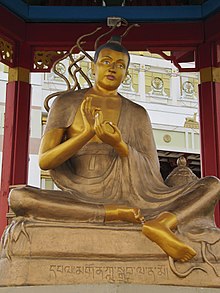You are currently logged-out. You can log-in or create an account to see more talks, save favorites, and more. more info
Madyamaka Talks

Madhyamaka (Sanskrit: मध्यमक, romanized: madhyamaka, lit. 'middle way; centrism'; Chinese: 中觀見; pinyin: Zhōngguān jiàn; Vietnamese: Trung quán tông, chữ Nôm: 中觀宗; Tibetan: དབུ་མ་པ་, Wylie: dbu ma pa) refers to a tradition of Buddhist philosophy and practice founded by the Indian Buddhist monk and philosopher Nāgārjuna (c. 150 – c. 250 CE). The foundational text of the Mādhyamaka tradition is Nāgārjuna's Mūlamadhyamakakārikā ("Root Verses on the Middle Way"). More broadly, Madhyamaka also refers to the ultimate nature of phenomena as well as the non-conceptual realization of ultimate reality that is experienced in meditation.
Since the 4th century CE onwards, Madhyamaka philosophy had a major influence on the subsequent development of the Mahāyāna Buddhist tradition, especially following the spread of Buddhism throughout Asia. It is the dominant interpretation of Buddhist philosophy in Tibetan Buddhism and has also been influential in East Asian Buddhist thought.
According to the classical Indian Madhyamika thinkers, all phenomena (dharmas) are empty (śūnya) of "nature", of any "substance" or "essence" (svabhāva) which could give them "solid and independent existence", because they are dependently co-arisen. But this "emptiness" itself is also "empty": it does not have an existence on its own, nor does it refer to a transcendental reality beyond or above phenomenal reality.
| Title | Speaker | |
|---|---|---|
Madyamika/Yogachara Schools of Emptiness/SynthesisSerial: BZ-00964A Three Bodies of Buddha pt. II, Sesshin Day 2 Madyamaka, Trikaya, Emptiness, Yogachara, Religion, Emotions, Karma, Sixth Patriarch... |
Mar 13 1994 Berkeley Zen Center |